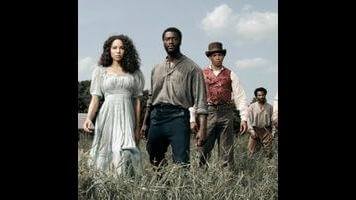WGN America’s Underground is a taut thriller disguised as a history lesson

With a certain Republican presidential candidate attempting to surf into the White House on a wave of what pollsters are euphemistically calling “racial resentment,” it’s either the best or worst possible moment to debut a drama series about American slavery. The Confederacy and its cotton economy, built on the keloid-scored backs of hundreds of thousands of African slaves, constitute a span of history so horrific, painful, and fraught, that for some, minimizing its importance becomes a viable alternative to confronting it directly. Slave narratives often feel like punishment—even when a film is as well crafted and affecting as 12 Years A Slave, good luck finding anyone with the constitution to watch it twice. That puts WGN America’s Underground in the precarious position of asking viewers to pay weekly visits to a period many would sooner avoid entirely. But Underground isn’t an unpleasant show. In fact, it’s surprisingly easy to binge considering how nauseating the subject matter can be.
Underground manages to thread the needle because creators Misha Green and Joe Pokaski refuse to choose between a stark, sobering history lesson and a rousing, suspenseful thriller. American slavery hasn’t been frequently explored in series television, so Underground is bound to be compared with Alex Haley miniseries adaptations Roots and Queen and BET’s recent The Book Of Negroes, the touchstones of a sparsely populated TV genre. But Underground bears a closer similarity to Charles R. Johnson’s historical novel Middle Passage, a surprisingly rollicking high-seas adventure set on a slave ship. The duality is initially challenging, since slave narratives are typically too gutting to entertain. But that duality is baked into the setting. Traditional folk song “Follow The Drinking Gourd,” for example, has a soothing melody, but its lyrics are coded directions to lead fleeing slaves north to freedom. Slaves had to find moments of levity and beauty to survive their dismal daily lives without losing sight of the constant life-and-death stakes.
From the opening body-mounted shot of Noah (a ferocious Aldis Hodge) hurtling through the dusky woods, Underground focuses on the desperate, dangerous journey north. Unlike the other slaves, Noah doesn’t need any further incentive to escape from bondage. He’s already been separated from his loved ones, and his most intense relationship on the plantation is his bitter rivalry with Cato (Alano Miller), a slave whose cold pragmatism endears him to plantation owner Tom Macon (Reed Diamond) but makes him a traitor to his fellow slaves. Then again, Noah is also watching a simmering pot, a torrid eye-contact affair with Rosalee (Jurnee Smollett-Bell), who needs to be nudged toward freedom. Rosalee’s life as a house slave is just as unbearable as Noah’s life in the cotton fields, but her circumstances are different due to her strong family ties to the plantation. Rosalee’s mother Ernestine (Amirah Vann) is the head house slave, doing what she must to keep her daughter and clever carpenter son Sam (Johnny Ray Gill) relatively out of harm’s way. But by the end of the pilot, Rosalee has seen enough horror to stoke her desire to escape, and a shocking incident in a later episode makes doing so more urgent.
Focusing on the escape allows the show and its characters to maintain hope in an environment characterized by despair. There’s enough human cruelty in the pilot—some of which evokes Toni Morrison’s most unsettling work—to repel the audience if the show was confined to the Georgia plantation where most of Underground is set. The brutal scenes are vital to establishing why the characters are willing to set off in hostile terrain and risk death if it means never returning to slavery. When Noah and teenaged slave Henry (Renwick Scott) manage to decode the map hidden in the lyrics to “Drinking Gourd,” it’s a well-earned moment because the audience understands the significance and the stakes. Per the title, Underground is also interested in the lives of the abolitionists whose false-bottomed floors gave runaway slaves a place to hide. Anti-slavery lawyer John Hawkes (Marc Blucas) and his wife Elizabeth (Jessica De Gouw) are important components of the show, but Green and Pokaski wisely avoid the “white savior” narrative by keeping the focus on the slaves rather than their allies.
Underground benefits from its deliberate pacing. This is, after all, a heist story, except that the thieves are literally stealing their own bodies. All the components of a tense thriller are here, encapsulated in a scene in which Noah and Sam test out a harness system to aid in their escape while Tom Macon looms nearby. The scene is reminiscent of the iconic CIA infiltration sequence from Mission: Impossible, but all the more impressive since the plan is conceived by slaves whose ingenuity flourished even as they were legally forbidden to open a book.
The show is so frequently reminiscent of contemporary caper thrillers, it doesn’t need to work nearly as hard as it does to modernize itself. The use of anachronistic pop music aligns the show with its network peers, Salem and the sadly canceled Manhattan, officially making WGN the home of gussied-up historical dramas. Sometimes it works beautifully, as in the opening shot of Noah’s sprint in the pilot, set to the looped dog barks and hyperventilation in Kanye West’s “Black Skinhead.” Other times the modern music feels tonally out of whack, and Green and Pokaski could learn from their characters, who figured out how to accomplish lofty goals using only what they had at the time.